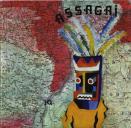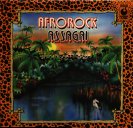Assagai

Assagai was anchored by respected African musicians Louis Moholo, Mongezi Feza, Fred Coker, and Dudu Pukwana. They were signed by British label Vertigo in the label's attempt to capitalize on the popularity of Afro-rock bands such as Osibisa. They were, I'm told, the only African or "Black" band ever signed by Vertigo. Their career was relatively short - two albums plus a couple of additional songs, released over a period of about two years in the early 1970s.

|
1. Telephone Girl (Duhig / Field / Havard)
2. Akasa (Coker) 3. Hey Jude (Lennon / McCartney) 4. Cocoa (Coker) |
5. Irin Ajolawa (Duhig / Coker) (misprinted as "Irin Ajoliana" on the CD reissue) 6. Ayioe (Coker) 7. Beka (Pukwana) 8. I'll Wait For You (Coker) |
Assagai's first (self-titled) album was issued in 1971 in the United Kingdom on the Vertigo "swirl" label (#6360 030). The album was reissued on CD in 1994 by Repertoire Records (#REP 4448-WP). It contains several original songs written by members of the band, their cover versions of The Beatles' "Hey Jude" and of Jade Warrior's "Telephone Girl", and a song "Irin Ajolawa" co-written by Tony Duhig of Jade Warrior.
Interior artwork and release notes
|
1. Barazinbar (Havard)
2. Wanga (Mdenge) 3. La La (Mdenge) 4. Dalani (Pukwana) |
5. Bayeza (Mdenge)
6. Sanga (Field) 7. Come Along (Mdenge) 8. Kinzambi (Duhig) |
The second Assagai album has an interesting and somewhat schizophrenic history. It was initially released in late 1971 under the name Zimbabwe - a test pressing was made on the Vertigo "swirl" label (#6360 058) but the actual release of the album took place on the Philips label. The album's cover and sleeve were designed and drawn by noted album-artist Roger Dean. All musicians are credited on the back cover; Jade Warrior members Tony Duhig, Jon Field, and Glyn Havard are credited for both performance and song-writing.

This LP has reportedly been reissued in 2010 (as Zimbabwe). The reissue has been described to me as being an unauthorized, limited-quantity issue, very probably a dub from a first-generation vinyl pressing (i.e. not made directly from the master tapes). The cover is reportedly a reproduction of the original (including the Philips stock number), but the LP itself has black labels which do not mention Philips or Vertigo.
Like Assagai's first album, Zimbabwe includes a mix of original tunes written by members of the band (including newcomer Martha Mdenge, who has one of the loveliest voices I've ever heard) and cover versions of Jade Warrior tunes - specifically "Barazinbar" (from Released) and "Sanga" (from Eclipse). There's also a new song "Kinzambi" written by Tony Duhig.
|
1. African Rhapsody Part 1 (Chaka)
2. Black Ant (Osibisa) 3. Kotoka (Osibisa) 4. Movin' (Simba) 5. Louie Louie (Simba) |
6. Kondo (Assagai)
7. Jabula (Assagai) 8. Tiksh Billa (Grutz) 9. Listen Here (Grutz) 10. African Rhapsody Part 2 (Chaka) |
Performances and songs by Assagai also appear on a multi-band compilation album Afro Rock Festival issued on Contour Records (#2870-311, date uncertain). Assagai is credited with two songs "Kondo" and "Jabula", neither of which appear on either of their own LPs.
Several members of Assagai (the brass and reed players) joined up with Tony Duhig, Jon Field, and Glyn Havard of Jade Warrior in a short-lived lineup called Simba. This lineup is known to have recorded at least two songs - an original "Movin'", and a cover of "Louie Louie". These songs were released on a 45 RPM single on the Fire label (#FIR100) and also appear on the Afro-Rock Festival LP.
Assagai never achieved commercial success, and the band's members dispersed to work on other projects not long after the release of Zimbabwe. Dudu Pukwana recorded and toured through the 1970s and 1980s, until his death in 1990. Mongezi Feza passed away in 1975. Louis Moholo was still playing well into the 1990s.
Further information about Assagai and its member musicians can found in the LP and CD artwork (see the links above), and also in John Wickes' "Innovations in British Jazz, Volume One, 1960 - 1980" (Soundworld Publishers, ISBN 1-902440-01-3)
Copies of Assagai's albums are not all that easy to come by. The original Vertigo and Philips LP issues of Assagai and Zimbabwe are collector's items and are not often available on the used-LP market. The 1994 Repertoire Records CD reissue of Assagai has been out of print for years, but used copies occasionally show up on the market. LP copies of the AfroRock reissue of Zimbabwe seem to be reasonably easy to find. The Afro Rock Festival compilation LP is reported to show up occasionally in English charity shops.
If you're interested in acquiring copies of any of these albums, two sites you should probably keep an eye on are the multi-dealer listing service GEMM, and the well-known auction site eBay. At the date of this writing, several dealers on GEMM are listing copies of the 2010 unauthorized LP reissue of Zimbabwe.
Page design by Dave Platt
Thanks to Larry Gingras for assistance with Zimbabwe.
Thanks to Kok Yong for the lead to Afro Rock Festival.